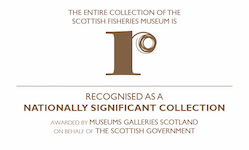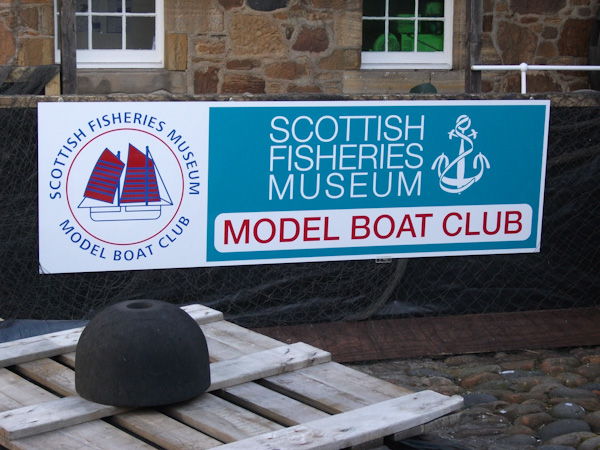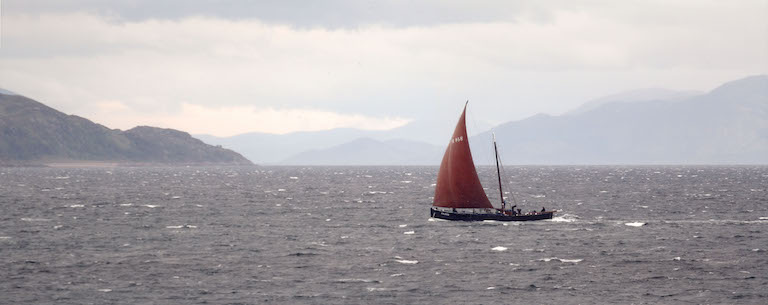Inside the Museum Boatyard
Spring and summer 2015
The boat that you see undergoing a major refit by the members of the Museum’s Boats Club is White Wing, the second and smaller of the Museum’s two sea-going heritage fishing boats.
ME113 White Wing
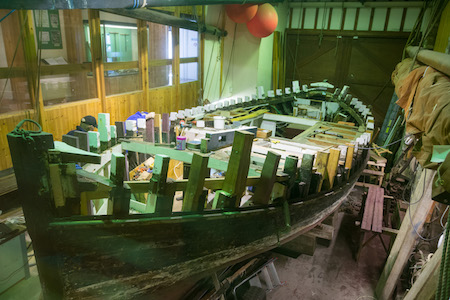
White Wing in Boatyard
White Wing is a 10 m (33 feet) “Baldie” – a small version of the “Fifie” herring drifters found along the east coast of Scotland – being clinker built of larch planks on oak frames. She was built in 1917 at Gardenstown, on the Moray Firth, by James Cadger for John Ritchie of Whitehills, Banffshire. She fished out of Whitehills until 1942 when she moved south to Gourdon for creeling and haddock line fishing, with up to two miles of lines with hooks baited with mussels by local women working in the tarred sheds behind their houses. The boat was later bought by the BBC to star in its film The Shutter Falls about the decline of the herring fisheries along the Moray Firth, and once filming ended it was gifted to Coull Deas MBE (its skipper for the film) who brought it to the Museum in 1986. It still travels around the Scottish coasts, and in 2014 it led the Commonwealth Games flotilla on the Clyde and provided the stage for the final televised concert.
The 2015 White Wing refit

White Wing in Boatyard
The present refit that you can see is a major refurbishment of the hull frames, deck beams, decking and other external and internal timber to maintain White Wing in A1 sea-going condition. The work, with timber from Black Dog Timber Ltd in Forteviot, is expected to take most of this year, with the boat being back in the water in Spring 2016 to support her big sister FR958 Reaper (moored opposite the Museum) in the Boats Club’s Outreach Programme.
ME113 White Wing, skippered and crewed by members of the Museum’s Boats Club, is a small “Fifie” fishing boat often called a “Baldie”. The reason for this name dates back to the 1860s when the first of these small boats were being built at a time when Scots were sympathetic to the unification of Italy being led by Garibaldi : these new class of small boats were named in tribute to him, with the “Gari” bit later dropped! This outward looking perspective is also responsible for those bigger herring drifters with raked sterns being called “Zulus” after the South African wars of the time : you will have seen Research, the big Zulu drifter in the Museum’s central gallery.
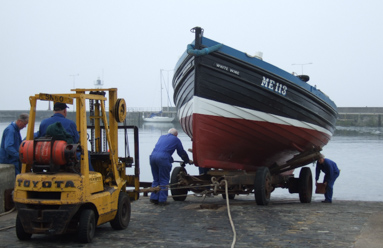
Launching White Wing after the Refit
When White Wing was launched in Gardenstown in 1917 she had a two masted lug rig with the dipping lug foresail being the larger of the two, and also an auxiliary Kelvin 26/30 engine with the propeller shaft originally coming out through the hull. This was changed to an exit via the stern post when a Perkins engine replaced the Kelvin, but unfortunately the shaft was too high to enable a strong grip of the water by the propeller and thus preventing White Wing from having the power to tow a seine net to catch white fish, hence the focus on long-line fishing and creeling. Some of the problems were overcome in 1976 when the current Lister 24 engine was fitted.
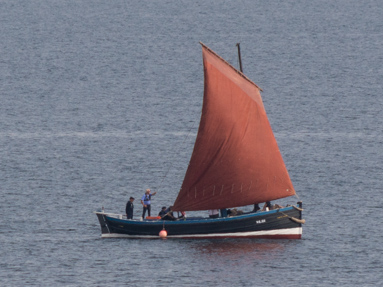
White Wing under sail off Anstruther
She has a couple of narrow bunks in the small cabin towards the bow, but for some outings up to four sleep and cater aboard. An important attraction for the Museum and the Boats Club is that – unlike the bigger 70’ Reaper – White Wing can go through the Forth-Clyde Canal to reach the Clyde and the West Coast. Because of this she was invited to feature at the launch of the Millennium Wheel (ship lift) at Falkirk and at its 10th anniversary, and has also been pulled by horse – ridden by Coull Deas - along the canal to Kirkintilloch!
The Boats Club and the Boats

White Wing entering Cellardyke Harbour
Should you wish to know more about the Museum’s heritage boats – both ashore and sea-going – a booklet (The Fleet : a guide to the historic vessels at the Scottish Fisheries Museum) is available in the shop.
Information on the events and outreach programmes of the Museum’s Boats Club can be found on the Museum’s website at the Boats Club Outreach page.
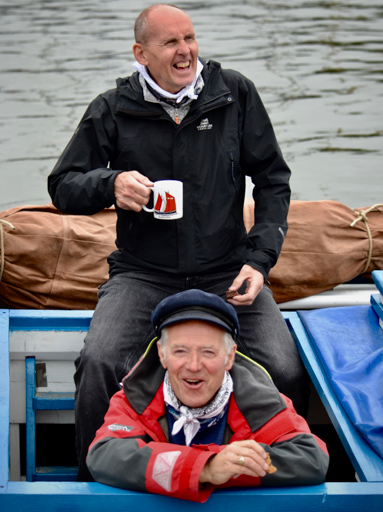
Some White Wing crew Members in 2019
Should you be interested in joining the Museum and its Boats Club as a volunteer to work on heritage boat maintenance and restoration, and/or to help crew Reaper and White Wing during the summer season, please don’t hesitate to contact us either via the website, or by just coming along to the Boats Clubs regular meetings in the Museum café where members gather at 10.00 am on Mondays, Thursdays and Saturdays. Don’t hold back : come and try out the Boats Club, learn new things, and meet an amazing bunch of guys and girls!


